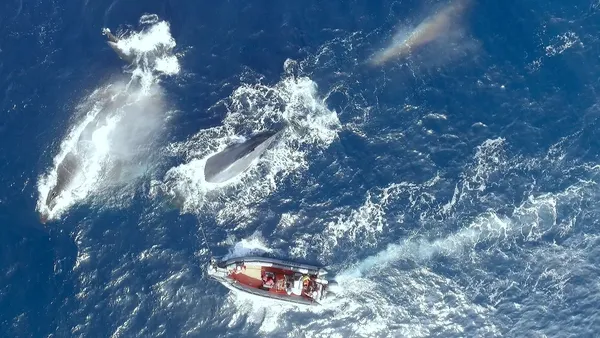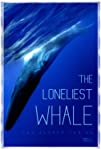Eye For Film >> Movies >> The Loneliest Whale: The Search For 52 (2021) Film Review
The Loneliest Whale: The Search For 52
Reviewed by: Jennie Kermode

The signal was first detected by military sonar in 1989. The story came to public attention through an article in the New York Times in 2004. Soon everybody was talking about 52; but 52, it seemed, couldn’t talk to anyone. Transmitting at 52 hertz, unlike all other whales, it seemed to be unable to communicate, drifting through the oceans all alone.
It’s a tragic, romantic notion, but a little bit of consideration demonstrates obvious flaws in the story. Whales are not stupid; they would know that 52 was there. They would be aware of the signals even if they couldn’t understand them. Lots of group animals support disabled individuals within their communities and whales are no exception – they would still be able to interact with 52 even if they couldn’t share vocal communication. That being as important as it is to them, however, 52 would be missing out on a lot – and so the legend persists, and we all know how legendary whales can affect people.
There’s more than one Captain Ahab in this particular case. Joshua Zeman is the filmmaker, who raised funds on the internet, an expression of public longing to make contact with this unusual creature. John Hildebrand is a professor from the Scripps institute of Oceanography in San Diego, a specialist in bioacoustics and one of the best placed people outside the military to track down 52’s distinctive acoustic signature. John Calambokidis is a biologist who, in the course of his research, once stumbled upon a hybrid of blue and fin whale, and thinks that might be the explanation for 52’s unusual voice. Together the three set out in a boat called Truth with a one week deadline (before the money runs out) to search around 354 million square kilometres of ocean for an individual whose voice has not been heard at all for a decade.
Both blue and fin whales live to around 80 or 90 years of age, so there is still a fair possibility that 52 is out there somewhere. What’s more, they have migratory routes and gathering spots which help to narrow down that seemingly impossible search. The team use two primary techniques. Firstly, they hook up with academics already scanning the ocean to ask them to listen for 52. Secondly, they engage in the rather precarious business of sticking monitors onto the sides of other whales in the hope that one of them will pass near their target. It’s highly unlikely to work, and for most of the film it seems fairly pointless, though their enthusiasm is engaging, but there’s an unexpected ending to this documentary which will leave viewers feeling thrilled and amazed.
In the meantime, there’s a chance to learn about the technology used to locate whales, about how other human technologies negatively impact them, about the horror that was commercial whaling and about the unlikely hit record which brought the song of humpbacks to the masses and changed public perception of whales, narrowly saving them from extinction. Much of this has been done better elsewhere but the film is strong when it focuses on the significance of connection, such as when musician David Rothenburg explains how he uses a clarinet and an underwater speaker to engage with whales. Here it acknowledges the significance of the vast amount which we still don’t know about whales, their complex communication systems, and the ocean more generally. The spirit of enquiry comes to the fore.
The Loneliest Whale is being widely interpreted as a film about isolation and the importance of togetherness, given additional resonance by the experience of lockdown, but it is just as much a film about the desire to know and understand for its own sake – a reminder of just how much can be gained from exploration (of places or ideas) for its own sake, and of how much we stand to lose if we narrow our thinking and reject that. It is also a film about a whale, with enough footage in and on the water to excite animal lovers, but there’s more to the whale than you might expect.
Reviewed on: 03 Apr 2022



















